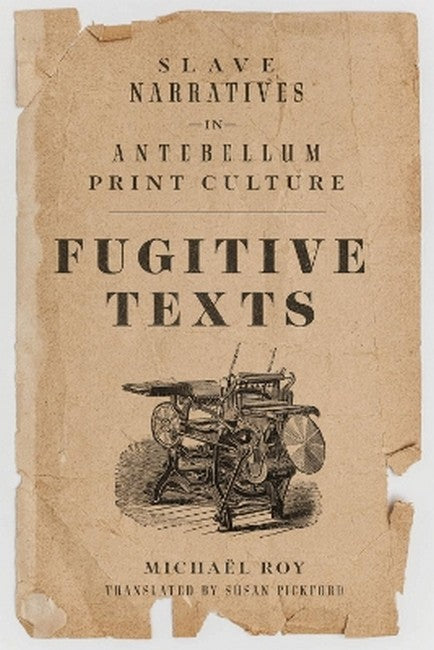Michael Roy is an associate professor of American studies at Universite Paris Nanterre and a fellow of the Institut Universitaire de France. His work has appeared in journals such as Slavery & Abolition, MELUS, and Papers of the Bibliographical Society of America. He is the editor of Frederick Douglass in Context.
Request Academic Copy
Please copy the ISBN for submitting review copy form
Description
Prologue - Runaway Bestsellers? Chapter 1 - "The general diffusion of abolition light": The Institutional Origins of the Antebellum Slave Narrative Raindrops, Autumn Leaves, and Snowflakes: Publishing and Circulating Antislavery Literature in the 1830s The Narrative of James Williams as Antislavery Propaganda Faithful Portrait, Lawful Weapon: Charles Ball's Slavery in the United States Paradoxical Presences: The Narratives of Olaudah Equiano and Chloe Spear Chapter 2 - "My Narrative is just published": Agency, Itinerancy, and the Slave Narrative Marginality, Itinerancy, and Reform in Antebellum America The Transatlantic Journeys of the Narrative of the Life of Frederick Douglass, an American Slave Reprinting and Recycling the Narrative of William W. Brown, a Fugitive Slave Other Narratives, Other Trajectories: Henry Bibb, Leonard Black, Sojourner Truth Chapter 3 - "Quite a sensation": Slave Narratives in the Age of Uncle Tom "The servile publishers of that day": Antislavery and the Book Trade The Business of Twelve Years a Slave Old Friends, New Names: Frederick Douglass and Charles Ball Redux Incidents in the Life of Incidents in the Life of a Slave Girl Epilogue - The Slave Narrative Unbound
"Ingeniously conceptualized, deeply researched, and forcefully argued. . . . A beautifully written book."-- "Textual Cultures" "Fugitive Texts adds immeasurably to our knowledge of African American writing and publication, and it offers us a new way to think about 'the slave narrative' as a genre. . . . Roy's book is superbly researched and carefully argued, and it makes a unique contribution to African Americanist criticism."-- "Early American Literature" "Gives slave narratives a renewed breath of life. . . . Fugitive Texts significantly contributes to studies on slavery, abolition, gender, print culture, the antebellum era, and African American studies. . . . Treating narratives as an artifact to unveil new layers of how the formerly enslaved asserted themselves and made their voices 'heard' broadens our understanding of the antebellum period. It allows us to grasp how people came to form meanings for these printed volumes."-- "H-Net Reviews" "This evocative study throws into stark relief the material conditions of authors who not only produced texts but also shepherded them through print infrastructures and into the hands of readers. Making contributions to African American literary history, book history, and print culture studies, Fugitive Texts encourages continued conversations about the material conditions of this literary history."--Brigitte Fielder, author of Relative Races: Genealogies of Interracial Kinship in Nineteenth-Century America Praise for the French edition: "Offers a new approach to slave narratives."--Etudes litteraires africaines "The historical sweep Michael Roy carries out here allows him to advance strong conclusions."--Lectures "Rethinking the place of slave narratives in the literary and political fields of the antebellum United States, revisiting presuppositions: these are the points which allow this rigorous, vigorous, and very well-written work to stand out from other analyses of these texts."--Textes & Contexte

